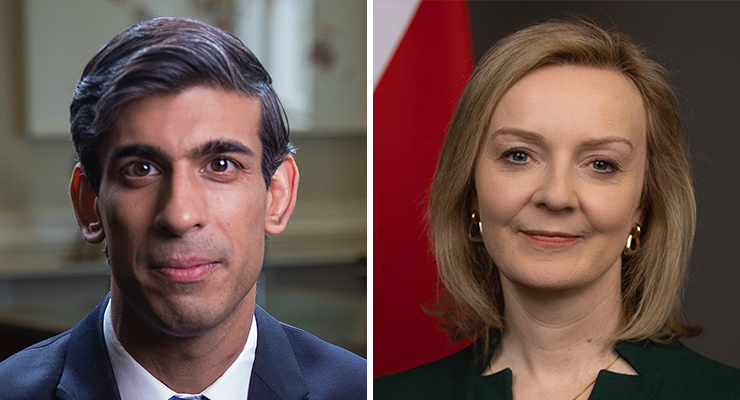
Whatever criticisms might be levelled at Scott Morrison and Josh Frydenberg over their massive spending, be thankful we didn’t have Boris Johnson and Rishi Sunak.
The absurdly wealthy Sunak was Johnson’s chancellor. His resignation helped precipitate the mass ministerial departures that led to Johnson’s resignation, and he’s now up against Liz Truss in a truly uninspiring contest for the prime ministership. Whoever wins faces an inflation nightmare.
On Wednesday, the Office for National Statistics released its latest inflation data, for June. It showed UK inflation rose to 9.4%, up from 9.1% in May after another sharp rise in petrol and food costs. Inflation hasn’t been this bad since the early Thatcher years. It’s now above the 9.1% reported for June for the US.
Surging inflation means real wages are in freefall: wage data showed a record fall in real pay of 2.8% in the three months to May, an outcome that sets up a miserable autumn and winter for millions of British workers and their families.
It opens the way for the Bank of England to boost its base rate by as much as 0.50% — maybe more — when it meets in August. Last night the European Central Bank lifted rates by 0.5% to zero, with many more rises expected.
An August rate rise will be the sixth from the Bank of England in its current campaign against inflation. The previous five have all been 0.25%. The bank expects inflation to peak at about 11% later in the year. By comparison, the Reserve Bank sees the Australian consumer price index (CPI) peaking around or just above 7% by the end of this year.
We’ll get an update on our inflation rate next Wednesday when the June quarter CPI is released. The 5.1% rate for the March quarter is clearly out of date — market forecasts range from well over 6% to just over 7%, with 7% or more forecast for the current September quarter — and the Reserve Bank is almost certain to lift rates again when it meets the following week.
In her campaign for the prime ministership, Truss is calling for tax cuts. Sunak says tax cuts will simply further fuel inflation. But Sunak is hardly in a strong position to pose as an inflation hawk. The UK budget deficit was 8.1% of GDP in calendar 2021 — down from 12.8% in 2020, but still remarkable.
Here the deficit reached 6.5% in 2020-21, but in the last Frydenberg budget, the 2021-22 deficit was expected to be 3.4%. Deficits under the Tories have never fallen below 2.2% since they were elected in 2010.
Massive deficit spending has been helping to fuel UK inflation, leaving the Bank of England to do all the work to curb it. With UK mortgage holders much more likely to hold fixed-rate loans, the UK economy is likely to be less responsive to rate hikes than here. So Sunak or Truss will face some very difficult decisions once autumn arrives and they get to move into No. 10.









When one despairs at the low level of political talent, vision and courage on offer, the truly appalling Tory party demonstrates it is not as bad here as it could be. Some comfort!
But compare like with like. Not much talent in the LNP.
Not much? I cannot see any talent in the LNP – zero/zilch/zip/nada/diddly-squat.
The brits cant take a trick. First they thought brexit was a good idea. Then they elected Boris. Now its a choice of two other silverspooners who are out of touch with reality.
No hope for them for while.
Hey look at the GAS situation in Germany Brexit was and remains a Great idea.
Truss is likely to win the geriatric Tory membership with her terrible promise to immediately cut taxes.
And ramping up their ever burgeoning debt by providing aid to Ukraine. Same with Europe. Borrowing to their own citizens detriment.
Have a read on the RBA website on how the RBA board works, it has a requirement to report “from time to time”
If the chair and the treasurer do not agree the governor general decides.
And dont worry or compare others, the problem is we always have inflation just that someone decided to target it at 2-3 percent.
Why not zero percent. So we are dealing with and excess to PLANNED inflation.